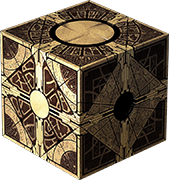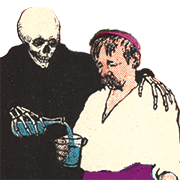|
This thread is for people interested in making up their own rules for tabletop RPGs, whether its a modification to an existing game or a brand new system. This includes criticizing parts of systems you'd like to fix, comparing rules from different games, sharing what you've made, and discussing design principles. Useful terms: Bounded Accuracy: A design principle used in D&D's fifth edition that scales d20 bonuses logarithmically rather than geometrically as characters level up. So named because it binds how accurate your character can possibly become when trying to hit in combat. Crunch: Essentially, rules and mechanics. If a game is "crunchy," a lot of things are defined in the rules. The opposite term is rules-lite. d20 System: This can refer in a broad sense to any system that resolves actions using a D20, such as D&D fifth edition. More strictly, it refers to a specific system and its accompanying trademark legally owned by Wizards of the Coast and used in D&D third edition. Dice pool: Systems where players roll a higher number of dice when they're better at something. May use funky dice. Funky dice: Non-standard dice sizes and markings. Examples include Fudge dice, Zocchi dice, and the dice they're planning to use in the MCDMRPG. OSR: Short for Old School Renaissance/Revival. A movement that appreciates the style and design of early TRPGs, like the original Dungeons and Dragons. Percentile: A system where actions are resolved using by rolling from 1-100. Point-based: A system where you purchase abilities using points, like GURPS. Contrast with systems that use classes. Though there are a small number of systems that are simultaneously class-based and point-buy. Roll-under: A system where an action is successful if you roll under a target number, as opposed to higher. If you're interested in publishing the game you make, the information in the TG Design/Production/Publishing might be helpful. If you'd like to talk about design of board games instead of RPGs, check out Board Game Design Laboratory. Dungeon Meister fucked around with this message at 21:54 on May 9, 2023 |
|
|
|

|
| # ? May 8, 2024 09:13 |
|
Currently trying to bring Wildsea's Aspects system (some of the best TTRPG tech I've seen in years) into 2d20. It's rough going, but I am committed.
|
|
|
|
I've been catching up on OSR systems lately, coming from 5e & PBtA and then a lapse in gaming for a while. I started out with Dungeon Crawl Classics, which is a great read but I'm starting to feel like there's more going on than I would have in my ideal game. I read Mothership last night, Wolves Upon the Coast over the weekend, Cairn before that, and Whitehack 4e before that. I like the roll-under mechanic a lot, that feels very clean and intuitive to me. And seems like a benefit to adventure design to not have to plan out a DC for every little thing, or expect a Judge to come up with one on the fly. And in Mothership, rolling under with percentile dice just feels right for a sci-fi setting.
|
|
|
|
Hey, a new thread! Here's a fun thing I'm working on. In Tailfeathers, I made the tactical sports (kazzam) half of the game wholly mechanically isolated from the mystery solving side while I got things working and balanced. Now I'm working on building connections between the two, but I found that I really liked the purity of competition you got in kazzam - it's the closest to a level playing field I've played in a tactical RPG. I felt this huge reluctance to just say that getting "exhausted" while solving mysteries would make you worse in the sport. And when I asked my players, they said essentially the same. So I've combined the idea of shock cards which have a penalty and a unique discard method with the battle goals from Gloomhaven to make a unique and fun recovery mechanic: Your conditions (like Exhausted) give you penalties outside kazzam but one way to recover from them is to do a specific thing in the kazzam match. (E.g. "never move farther than your speed - 2 on any one action"). So the purity is preserved - if you just want to play to win, you can go all out and stay tired. But if you want to hold back a bit, you can give yourself the extra challenge to get the extra recovery. And just so everyone can get in on the fun, if you have no Conditions you get a miscellaneous goal to try to achieve to earn an action point. One place I'm having a little bit of a block is on the social side: if you want to impress your Kazzam opponent or have a crush on them, there are special goals for that and if you succeed, well they're impressed. Simple. But I also have goals for if you have a rivalry or grudge against an opponent. If you succeed in that goal, basically, you show them up completely. But what do you actually get out of that other than a sense of smugness? Any thoughts?
|
|
|
|
Something Else posted:I've been catching up on OSR systems lately, coming from 5e & PBtA and then a lapse in gaming for a while. I started out with Dungeon Crawl Classics, which is a great read but I'm starting to feel like there's more going on than I would have in my ideal game. I read Mothership last night, Wolves Upon the Coast over the weekend, Cairn before that, and Whitehack 4e before that. I like the roll-under mechanic a lot, that feels very clean and intuitive to me. And seems like a benefit to adventure design to not have to plan out a DC for every little thing, or expect a Judge to come up with one on the fly. And in Mothership, rolling under with percentile dice just feels right for a sci-fi setting. I haven't played Whitehack 4e, but I remember liking 2e. Particularly its Group system, which was one of the most elegant I've seen for handling skills and classes and works well with OSR.
|
|
|
|
May want to add a definition for Narrative Dice. The only experience I have is from Star Wars: Edge of the Empire but perhaps a more general definition is available.
|
|
|
|
nelson posted:May want to add a definition for Narrative Dice. The only experience I have is from Star Wars: Edge of the Empire but perhaps a more general definition is available. Narrative dice are a thing that only exists in Star Wars and Genesys, yeah? It's just FFG's term for "bespoke dice".
|
|
|
|
Jimbozig posted:Hey, a new thread! That was a very good way to deal with it, making consequences flow outward from the match rather than inward in a way that could make it less fair. As for what happens when you beat someone you have a grudge against, I have a few ideas but I don't know enough about your system to be sure which ones apply. A humbled rival could give you some kind of help on the mystery side out of newground respect. Or, if you have a grudge against someone it gives you a debuff outside of matches representing how preoccupied you are with it, until it's removed when you beat them.
|
|
|
|
CitizenKeen posted:Narrative dice are a thing that only exists in Star Wars and Genesys, yeah? It's just FFG's term for "bespoke dice". Itís fundamentally different than d20 or roll under/percentile and is therefore worth including for an alternative perspective. Also I believe MCDM RPG will use a similar system.
|
|
|
|
CitizenKeen posted:Narrative dice are a thing that only exists in Star Wars and Genesys, yeah? It's just FFG's term for "bespoke dice". Whatever term is used, there should probably be an entry for it in the OP. It's a concept that's been around at least since the board game Heroquest. My vote is for Funky Dice.
|
|
|
|
nelson posted:Itís fundamentally different than d20 or roll under/percentile and is therefore worth including for an alternative perspective. Also I believe MCDM RPG will use a similar system. I mean, I think the more appropriate addition would be a definition for "Dice Pools", as FFG's narrative dice are just a dice pool system.
|
|
|
|
CitizenKeen posted:I mean, I think the more appropriate addition would be a definition for "Dice Pools", as FFG's narrative dice are just a dice pool system. I think there's room for a distinction between Funky Dice like FFG uses and Dice Pools like those used in Shadowrun or White Wolf games.
|
|
|
|
Jimbozig posted:Hey, a new thread! It feels like if Kazzam is such an important cultural thing, then humiliating someone like that is going to have big social ramifications -- if your rival is the kind of person who has a load of mooks at their beck and call, showing them up in game of sport is going to mean all of a sudden a lot less people will be willing to follow their lead.
|
|
|
|
PeterWeller posted:I think there's room for a distinction between Funky Dice like FFG uses and Dice Pools like those used in Shadowrun or White Wolf games. Maybe? It's really just counting successes and failures, but on three separate axes (the "yes/no" axis, the "but/and" axis, and the "critical" axis). It's novel, but if every variant on a dice pool requires a definition, then that's opening a pretty big list of special definitions. Fate has its own dice pool mechanic that's different from WoD/Shadowrun. Also, Reign uses a Yahtzee mechanic that's incredibly novel. I'd also add Spectaculars, Dusk City Outlaws, and Legend of the Five Rings to the Funky Dice list. The forthcoming Outgunned uses funky dice and looks for pattern matching. Dread and Ten Candles have some pretty interesting core resolutions. I'd also list games that use cards, like Unbound or Through the Breach.
|
|
|
|
Dungeon Meister posted:I haven't played Whitehack 4e, but I remember liking 2e. Particularly its Group system, which was one of the most elegant I've seen for handling skills and classes and works well with OSR. Well, I haven't played it either, but I agree, the way Groups are designed feels like a bridge between PbtA-style tags and crunchier systems' skills or proficiencies. Or a looser yet more important version of the backgrounds that you see in many OSR systems. I'm still making sense of Whitehack and I'll be looking for opportunities to play/run it, but the way the book is written doesn't really make it easy to teach to someone who isn't fully invested in learning it.
|
|
|
|
PeterWeller posted:Whatever term is used, there should probably be an entry for it in the OP. It's a concept that's been around at least since the board game Heroquest. I would've included it but couldn't think of any term that was common enough. CitizenKeen posted:I mean, I think the more appropriate addition would be a definition for "Dice Pools", as FFG's narrative dice are just a dice pool system. Yeah, I definitely should include that.
|
|
|
|
Haven't seen this posted anywhere around here. DriveThruRpg and Roll20 are running Pocketjam right now. It's a 2 month game jam ending on July 1st. Your book has to be 20 pages or less. The theme is space. https://www.drivethrurpg.com/m/product/398249 The description covers some of the jam rules and the file itself is their packet on it. Sounds like they are looking into free promotion points or at least extra focus on jam releases for their front page. I'm part of a 2 man team and we are working on a narrative focused game inspired by Men in Black and the X-Files. We've got our mechanics roughed out and are gonna run a very early playtest this weekend just to see if anything stands out as super wrong or unworkable. We usually do video game jams together but this has been a fun change so far.
|
|
|
|
LeisureSuit Canary posted:Haven't seen this posted anywhere around here. I'd love to play that. My friends and I tried something very similar in an existing system (I think it was GURPS) and it didn't work out as well as we wanted it to.
|
|
|
|
CitizenKeen posted:Maybe? It's really just counting successes and failures, but on three separate axes (the "yes/no" axis, the "but/and" axis, and the "critical" axis). It's novel, but if every variant on a dice pool requires a definition, then that's opening a pretty big list of special definitions. I feel the multiple axes and the iconography instead of numbers are pretty important distinctions, and as you note, it's not unique to FFG. Maybe we do need sub-definitions for various different types of dice pools. I feel the terms in the OP are there to aid discussion and inspire design ideas, so explaining the difference between Reign's matching pools, Shadowrun's counting successes, and D6 Star Wars' cumulative pools might be worthwhile.
|
|
|
|
It may be worth mentioning there is still a wiki on SA homebrew design at https://forsoothgoons.com/tg/index.php?title=Main_Page. It has a fair bit of discussion of systems, but doesn't have a master index page, meaning you have to search for everything with the text search bar. There is an even older one at foxxtrot but it's archived and has an expired HTTPS.
|
|
|
|
Jimbozig posted:... My inclination for that knowing nothing else about the system, but in PbtA terms, would be to just Take +N forward to the next time you want to dunk on them socially, or get some other kind of leg up that involves pushing them down. -- I had always kinda avoided the other threads since then I might be obliged to actually finish something, but in the spirit of  , contributing to a new thread, and getting people to tell me why I'm a dumbass and someone has done this all already, here's my current forever RPG project: , contributing to a new thread, and getting people to tell me why I'm a dumbass and someone has done this all already, here's my current forever RPG project:Back 10,000 years ago in 2014, I got tapped to gut all the licensed material from another game so they could keep the rules around as a generic system. At the time I had the thought that it would suit an X-Com like game extremely well. Unfortunately for me, due to how some of the other rules worked I also thought, "What if it was diceless?!" In trying to make that work I asked other questions like, "Are stats and skills really necessary?", and "gently caress it! Lets just remove failure." This ultimately ended up like I was designing a game from nothing and only adding systems when I needed them to solve a problem. I just got there from the wrong direction by chainsawing everything off an existing system until there was nothing left. So the system, like Marvel Universe RPG, everything is predicated off a points pool (right now assuming roughly 8-12 points, subject to change). The first way you use points is by spending them. Spending points moves them to your spent pool. Spending is the basic resolution mechanic. So when you want to do something and the GM decides it will require a check, you're asked to spend points. There is no difficulty on a basic check. The options are as follows (numbers subject to change):
That's right. Dice are back! And they hate you.  Right now the SNAFU dice are used by the GM during the finale to gently caress with you by making you pay more for checks, or making you roll for something you could normally freely choose like the setbacks for underpaying. More about checks when we get to clocks. Right now the SNAFU dice are used by the GM during the finale to gently caress with you by making you pay more for checks, or making you roll for something you could normally freely choose like the setbacks for underpaying. More about checks when we get to clocks.The next way to use points is by Allocating them. This is how combat works in the system. So you have three action pools: attack, defense, and movement, where you allocate points at the start of a combat turn, and they get moved into spent at the end. Okay, I lied stats are back too. Each pool has a Recovery value (spent included), so instead of moving all your points into spent you move points equal to each pool's recovery value back to unspent and then move everything else to spent. Combat itself is extremely simple and is just a direct comparison of attack vs defense. Unlike MURPG over spending doesn't get you anything, so you always want to meet or beat by 1. Things like cover, aiming, equipment, and distance will modify the attack and defense pools. Also don't forget about the movement pool which is necessary if you want to move more than the base distance. For damage I'm using a soak system where any damage you take you have to soak it to zero. You might soak with equipment or use an ability that gives you a status in exchange for soaking damage. Speaking of statuses the last way points get used is by Pledging. Unlike spending or allocating you can Pledge points from anywhere even the Spent pool. Pledging is used for ongoing actions, and statuses. So say you want to drive a vehicle then you'll Pledge points toward doing that. Outside of combat that won't matter, but in combat it will limit how much you can spend and is the primary way I'll be balancing vehicles. Statuses are what you'd expect Panicked, Injured, etc. So you'd have an Injury Soak that stops some amount of damage, but ties up points until you heal the injury. I'm thinking about having a Wounded status for unsoaked damage such that when you can't pledge a point to Wounded is when you die. I'm sure someone is wondering what the point is when you can't fail a check. Jokes on you, I lied again. So failure happens "on the clock." I'm going to have to spend so much time in the rules beating clock use into the GM since the entire game hinges on it. Whatever the current objective is that can fail needs a clock, and then there are a couple things I skipped over that advance the clock. Like getting into combat, taking a rest to recover your points, or if for some reason you cannot or do not want to pay for a check you can take a tick on the clock for an unqualified success. How's that work with Pay 0? Well maybe you don't want the SNAFU die, or maybe I didn't tell you all about specialist checks which make it Pay 4, Pay 3, Pay 2, instead. Okay, wrapping up. The final bit I'll talk about is how characters are differentiated, there are the recovery values, mentioned earlier, but I'm also using "feats" so all skills and abilities are set up as self-contained feat-like things. If you don't have that feat you don't have to care about its rules. Actually equipment works like that too, they're just feats that are easy to swap out. So the feats let you do weird things like manipulate points between pools during certain actions, the specialist ones that act like skills and reduce the specialist check costs back to normal (and currently let you tap them for a free success.), or my favorite the one that adds ammo counting back into the game if you want to be a giant loving nerd. Thank you for reading this post, or not reading it. There is also an extended check system, but I left it out since I don't have it nailed down as well. (and it further undermines the dicelessness) Unhappy Meal fucked around with this message at 03:58 on May 12, 2023 |
|
|
|
So, I'm currently working on Oath of Light, a spiritual successor to games like Exalted, Weapons of the Gods, and Dreaming Waters. Specifically, I've adapted the dice-matching system from Weapons of the Gods alongside Exalted's broader system of power design, and paired that with the weapons system from Dreaming Waters. Basically, the most immediately obvious feature of Oath of Light's system is that while you can learn a lot of different powers, you only have immediate access to a few of them at any given time. In combat, you can "equip" a single "main" martial arts style and a single "support" style. Your main style determines the numbers you roll for attack, defense, and damage (rather than tracking your equipment, the game just assumes you have the right stuff unless it's seriously magical). You can swap styles on-the-fly, but only by paying a cost in Fight (HP). Fight is essentially a measure of your will to keep struggling, so the amount you start the battle with is dependent on the stakes. For your non-style abilities, you can know as many of them as you can buy with XP, and you always have them, but you're limited to equipping eight of them at once, and those are the ones you're considered to be "in-practice" with. Arts that you don't have equipped are available, but take proportionally longer to use, which makes them impossible to use in a single turn or in reaction to a hostile magic. The goal of all this was to have a system that lets you have as many crazy powers as Exalted does, but to limit the amount of things you have to have in front of you at a single moment, thus avoiding choice paralysis. You can essentially write down your styles on index cards, have them in front of you, and then switch out index cards at a moment's notice if you need to swap. You can pull out enemy stats more or less instantly by grabbing the same kind of index card (since the styles include all of your combat traits), and hand the same pieces of paper to a new player who wants to jump right in. Right now, what I'm working on is trying to make a Conditions system that's similar to the one in Weapons of the Gods, but that works without having the five-element-wheel and yin-yang axes that made the original fun to play with. I'm also doing a lot of research on the Hundred Years War and coming to the conclusion that what this game needs is Brutalist castles.
|
|
|
|
This is a really cool idea for a thread, it's interesting how many new systems seem to have sprung up after the ogl controversy. Matt Colville's particularly, the idea of fundamental attacks never missing is an interesting one. I have been picking away at my own sort of D12 based D&Dish system, but apart from a few weird ideas about damage bonus slots, revamping the stats and having dice explosions a-la Kids on Bikes, i don't have much right now.
|
|
|
|
Rand Brittain posted:So, I'm currently working on Oath of Light, a spiritual successor to games like Exalted, Weapons of the Gods, and Dreaming Waters. Specifically, I've adapted the dice-matching system from Weapons of the Gods alongside Exalted's broader system of power design, and paired that with the weapons system from Dreaming Waters. How do weapons work in Dreaming Waters?
|
|
|
|
Oh hey, a thread just in time for me to finish my new game! Retroclone thread regulars might have already seen an earlier version of You All Meet In A Tavern, but the new one has had some major reworking to improve and streamline it. It's a B/X-derived game, but even though adventures written for B/X and 1e (and possibly 2e too, but I've never played that) can be used with it after a trivial amount of conversion, every single part of the system has been changed. Task resolution is all roll-under (as in my earlier 'clone There's Always A Chance), attack rolls always cause damage but you score a bonus for beating the target's (ascending) AC, the whole thing is geared around single-session adventures with a victory objective set by a patron you meet in the titular tavern, character creation is simplified so should take under two minutes, a completely new fast combat system, etc etc. I'm in the final stages of laying it out as a professional-looking product using InDesign, but I'll be giving it and a sample adventure away for free just because, hell, why not? It'll hopefully be finished in the next few days.
|
|
|
|
Goblin Punch had a pretty interesting blog post that seems relevant to all this recently, looking closely at base resolution mechanics. I'm not 100% on board with all his analysis, but it's a really interesting alternate way to measure any mechanics you do come up with. I'm generally more interested in GM-facing systems for creating and running scenarios than PC-facing ones, but I have been trying to think through interesting ways to make non-combat situations as fun and complex as combat without becoming an absolute mess. FitD and the Free Kriegspiel movements have been big inspirations. I have some rough notes for a (semi-)5e compatible system for more involved non-combat skill challenges that I'm working on. quote:Whenever you have a skill check trying to resolve a problem, you set two numbers: a Difficulty/DC rating, which is the minimum number you need to roll to make progress, and a Complexity rating, which is sort of like the problem youíre dealing withís HP. I have a bunch more text unpacking that description and offering advice on what makes for good Complications in the post itself, but that's the core of it.
|
|
|
|
Dungeon Meister posted:How do weapons work in Dreaming Waters? You equip a weapon and decide what dice pool you want to use and then you're committed to that approach for a certain "interval" unless you pay a cost in HP to change it sooner. The main distinctions in Dreaming Waters were:
Oath of Light doesn't really use either of these conceits at the moment, although "weird weapons" is certainly something worth looking at at some point.
|
|
|
|
Sooner than I'd expected: You All Meet In A Tavern! The .zip contains PDFs of the rules, character sheets and a sample adventure. I'm interested to see what people think about the fairly major changes I've made to the B/X system while still keeping it easily compatible. Is the streamlining/simplification of combat to people's tastes, for instance? Or is more crunch always more popular? What's the view on there being no weapons, armour or equipment to choose at the start, but rather it being assumed that the PCs have all the basics necessary for the adventure? Is roll-under a turn-off, even though it was right there in B/X all along as "There's always a chance"?
|
|
|
|
Payndz posted:Sooner than I'd expected: You All Meet In A Tavern! The .zip contains PDFs of the rules, character sheets and a sample adventure. I'm into it, from what I've read so far! The whole armor system is especially cool--I might steal that at some point in the future. I'm increasingly of the opinion that crunchy character customization is really good at getting people hyped to play a game--it lets people spend a long time thinking about the game alone at home before they show up to play--but that it's often more of a drag on play itself than a help. Your game seems hyper-optimized for one-shot pick up play, and it seems like it's really well set up for that. Rather than crunch, it feels like tools to help connect the players into the scenario faster/give them a few more hooks to hang a character on might be good. Random rolled stats have a whole host of problems, but they were at least a really quick prompt for "a guy who's dumb but strong and charming"--a random list of personality gimmicks or something might be all you'd need.
|
|
|
|
Speaking of player customization, Iím playing around with an idea and I want to see if other folks think it could be fun. Itís a subpart of a larger rpg Iím not going into, but the resolution mechanic is card-based : every player character has a heavily modified deck of standard cards of 20* in the standard suits and the resolution mechanic is drawing 6* random cards and counting the total of a relevant suit. (e.g. you draw 6 cards and count how many hearts there are for a hearts challenge.). An important aspect of character creation is traits that gently caress with this (e.g. the Butlerís Sophisticated Trait lets them count clubs as spades for relevant tests. ) But what Iím wondering is if itíd be fun to let players decide the ratio of suits to each other. Like have 7 spades, 6 hearts, 4 diamonds and 3 clubs. Basically allowing players to weight their deck into a certain suit-as-stat fashion through an incredibly simple deck builder. Is that actually a fun knob to tweak or am I the only one who thinks build-your-own RNG is fun? If it changes anything, if I ever get comfortable in this working I wanna start loving with the numbers. *working numbers, subject to tweaking
|
|
|
|
Xiahou Dun posted:Speaking of player customization, I’m playing around with an idea and I want to see if other folks think it could be fun. I'd say you shouldn't have it completely free-form, or rather you should include some direction around it first. You'll end up with a lot of players who'll give up on working out the sheer number of options and either just do what's most simple, or not play at all. One way to get players into a basic deck could be to have a short series of personality/background questions in char gen that add and remove cards. Could even be sneaky and slip in a "if you're not satisfied with the proportion of cards you have, change them now." at the end, to effectively give them freeform building after the directed section. I could also see directly attaching deck changes to the character creation traits, such that per the example Sophisticated also gives you more clubs/spades in your deck. Unhappy Meal fucked around with this message at 03:59 on May 12, 2023 |
|
|
|
Unhappy Meal posted:My inclination there would be to not have it be completely freeform. You'll end up with a lot of players who'll give up on working out the sheer number of options and either just do what's most simple, or not play at all. One way to get players into a basic deck could be to have a short series of personality/background questions in char gen that add and remove cards. Could even be sneaky and slip in a "if you're not satisfied with the proportion of cards you have, change them now." at the end, to effectively give them freeform building after the directed section. Thereíd be a solid chunk of the rules as deck-building guidelines with a chart breaking down the probabilities at a bare minimum, yeah. I donít know what thatís gonna look like yet though. I really like the questionnaire idea too. It might clash with other parts of the system, but itíd be cool if I could make that work. Character creation is sort of part of scenario design right now, and this would give a bunch of more personal color on the player end if it works. Thanks a mill. Great feedback.
|
|
|
|
Speaking of core mechanics, I'm tinkering with revising one for my multiversal OSR-ish heartbreaker, and I can't tell if I'm just reinventing a system I saw somewhere else or not. Characters have three base stats and use a simple d20 roll-under system, rolling them for saves, attacks, and defending against NPC attacks. (All three stats can be equally viable combat stats, depending on a player's gear and class.) NPCs, however, don't have numbers for their version of these three base stats. Instead, they have zero, one, or two stars for each stat. If a player attacks an NPC with a certain stat and misses, the NPC gains that many stars. The NPCs spend stars as a resource to power their attacks (on their turn, not as an auto counterattack or anything). My main concern is whether this will disincentivize players from engaging in combat if the circumstances aren't optimal for their best stat, out of fear of failing and giving the other side more capabilities. If other games have tried something similar, I'd like to research how it went over. I wonder if some might feel that it's punishing failure... Anyone know if I might just be aping a game I don't remember having read? JMBosch fucked around with this message at 05:25 on May 12, 2023 |
|
|
|
JMBosch posted:Speaking of core mechanics, I'm tinkering with revising one for my multiversal OSR-ish heartbreaker, and I can't tell if I'm just reinventing a system I saw somewhere else or not. I don't know what game is similar, but that is explicitly punishing failure. That's not necessarily a problem depending on how OSR-ish you want to make it, though. Remember, these are the systems that gave you less XP for having a lower prime requisite, so your worse character is worse at leveling up and becomes even worse. Punishing failure was not something they avoided. It also will disincentivize them from engaging in combat, but again, that's in keeping with OSR, where gold was XP and encounters were often not balanced.
|
|
|
|
I think it's a decent enough mechanic, but it seems like it could very easily contribute to a system where you either failure spiral incredibly or mop up effortlessly. If the players fail, and then that allows the NPC to use an ability that makes it easier for the PC's to fail in the future(boosting their own defense, weakening the player's stats or offense, etc.) then it gets easier and easier every time for them to have more and more points for their big stuff and for players to be able to do nothing. While if the players just flat out succeed, then the NPC's may never be able to bring out the things that should actually make them a threat. If it's also invisible to players which stats enemies have a lot of stars in, it becomes a bit more opaque and hard to interact with. But for instance if a player knows that an NPC has three stars in Punch Power, which is also the PC's strongest attack stat, then they would need to weigh the risk of giving the enemy a lot of Power Points vs using a weaker stat of their own and maybe missing. I would say it would be more reasonable to have that system work in a way where someone is intentionally defending, if their defense works, they get more Power Points(tm) or whatever for their next round, for both PC's and NPC's, and otherwise they're passively gained(+x every time your turn comes up in the turn order) or gained as a response to being injured, to represent adrenaline flowing when someone gets stabbed or their getting desperate enough to bust out The Forbidden Technique or whatever.
|
|
|
|
You both bring up good points, thanks! The feedback loop of failure/success would definitely be an issue with this suggested change as is. And the rest of the game is trying to shave the sharper edges of OSR down a tad, so it might be a bit of a thematic conflict. The idea is part of trying to streamline a system that has both "saves" that are just roll under your stat and "attack rolls" that are roll under your stat minus your target's appropriate defense stat. The hope is to cut it down to solely roll under, regardless of the target's capabilities, but while also trying to maintain some tactical elements around fighting a creature with an approach it's good at versus one it's bad at (not just what the PC is good at). While the players won't know an NPC's stats at first, with only three stats, NPCs will generally be designed to telegraph which stats they might be strongest with. Rethinking it, I already have a resource type tied to each of the three stats, so I might be able to repurpose those a bit to instead use them as rewards for both PCs and NPCs. So instead of using stars for each NPC stat, they have 0 to 3 marked stats. If they attack with a marked stat, and the PC target avoids it, the PC gets a matching resource (incentivizing jumping into combat against targets that use a stat you're strong in). Then, maybe, if the PC attacks a target using one of the target's marked stats and misses, the target gains a matching resource instead (disincentivizing attacking a target using a stat it's strong in)? This approach still somewhat punishes failure, but also equally rewards success. However, while I like the potential for a bit of swinginess, I might just be overthinking the original roll under minus target's defense approach and "streamlining" by replacing one kind of math with another. I'll need to ruminate on it. JMBosch fucked around with this message at 04:59 on May 14, 2023 |
|
|
|
JMBosch posted:Speaking of core mechanics, I'm tinkering with revising one for my multiversal OSR-ish heartbreaker, and I can't tell if I'm just reinventing a system I saw somewhere else or not. The second is that avoiding risky combats is a core component of OSR games so worrying that players will play smart and not get into fights they can't win is missing the whole point of the genre! FitD and PbtA games, and my favourite threats-powered-by-failure game Danger Patrol, don't gear toward that kind of thing. In Danger Patrol there's no special rules for fighting a threat vs talking to one, it's all handled by the same barebones system. In the acronym games rolls are pushed by the players' descriptions of the narrative, there's no real defined "matchups". In both cases the only real constraint is remaining narratively consistent. Avoiding making rolls also isn't really a thing; In Danger Patrol a threat requires the same amount of successes no matter how you choose to deal with it and ignoring a threat is the only guaranteed way to make things worse*, and in the acronym games you describe what's happening until the GM triggers a roll, or the GM makes a move and you're in the Danger Patrol scenario. And in all of the above you have a great deal of flexibility; The GM makes a move or spawns a new threat but you the player decide how you address it. * each failed die generates one danger, an ignored threat automatically triggers a 3-danger effect, and die pool size is almost entirely in the players' control and can range from about 8 dice to just 1. The closest to what you're describing that I can think of is the FFG funny dice system. Fights can be obviously more or less difficult for your setup, you can choose to avoid an obvious fight by just going another way, and you can roll a roll that's worse than not having tried at all. But Genesys takes gradated success to the extreme, and the "shouldn't have rolled" results against an appropriate threat are very very low odds. More importantly the "failed" and "consequences" tracks aren't just independent, they're softly negatively correlated. Doing unexpectedly poorly on a task usually means you rolled a lower than normal number of consequences or a higher than average number of advantages, and vice versa. And again there's a lot of freedom in your actions; a melee combatant in a mainly ranged fight who rolled a bunch of advantages can feed those to the sniper or spend them on metacurrency. Basically the swingier you make combat the more you're going to incentivise people to avoid combats they don't know they can win, and the only real solutions there are to make them less swingy or make the combats non-optional. And the latter really goes against the OSR genre. Which I have no objections to personally, I only bring it up because that's how you self-described. Splicer fucked around with this message at 12:49 on May 14, 2023 |
|
|
|
Yeah, tiered roll results would definitely help with the sort of system I suggested. But not sure if I can pull that off in a way that both reduces the amount of math/cognitive load needed per roll and lets the target's strengths/weaknesses impact the results. (I'm not sure I want to write multiple possible results for how each enemy ability resolves based on the player's roll to avoid it, and just flavoring the tiered results based on the target's capabilities doesn't quite seem impactful enough.) I definitely want to maintain the OSR approach of avoiding a lot of fights being important or incentivized. (Though I probably need to shift the balance of combat vs. non-combat powers in the game a bit to better support that). But I think the primary thing I'm worried about in the player's experience, other than minimizing the amount of thinking that has to be done to estimate or resolve the impact of a roll, is: Splicer posted:you can roll a roll that's worse than not having tried at all
|
|
|
|
JMBosch posted:(Though I probably need to shift the balance of combat vs. non-combat powers in the game a bit to better support that). Something I experimented with once, was the idea that there's no such thing as combat or non-combat powers, and every combat power also has a non-combat effect, whether it's a passive + to doing Strong Things when you know the Megapunch(because you can't throw the Megapunch without having done a lot of working out) or that Bones To Ants Spell can be used to slip through narrow spaces after turning your own bones to ants(and then undoing it afterwards). I couldn't quite get it to work for the game I was doing it for, but I feel like it's a solution to the idea of some characters being combat specialized and others being non-combat specialized.
|
|
|
|

|
| # ? May 8, 2024 09:13 |
|
JMBosch posted:Yeah, tiered roll results would definitely help with the sort of system I suggested. But not sure if I can pull that off in a way that both reduces the amount of math/cognitive load needed per roll and lets the target's strengths/weaknesses impact the results. (I'm not sure I want to write multiple possible results for how each enemy ability resolves based on the player's roll to avoid it, and just flavoring the tiered results based on the target's capabilities doesn't quite seem impactful enough.) You can also get a bit fancy with monster defences. "Dangerous" - failure means tokens. "Safe" - no miss penalty, you're just rolling for side bonuses. "Risky" - Failure means tokens, but your attacks automatically do +2 damage. Tiered success is very easy with pure rollunder, just add more dice. "1 fail, 2 successes" is very easy to at-a-glance when you know all the numbers. Then you can do stuff with doubles or triples, or additional successes mean extra damage. Or it just gives you multiple routes for advancement, or an advantage mechanic, you get the idea. Splicer fucked around with this message at 18:08 on May 14, 2023 |
|
|


























